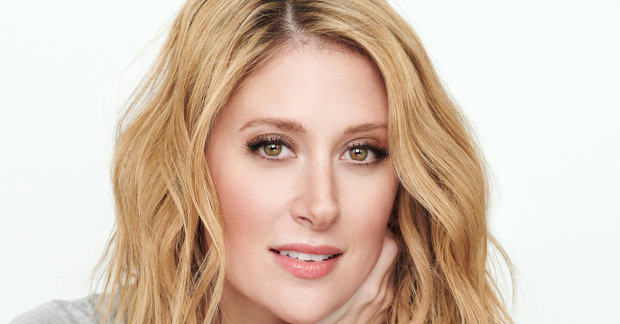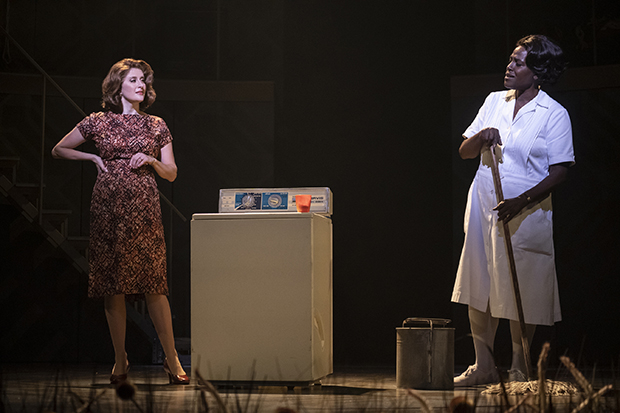With Caroline and The Bedwetter, Caissie Levy Is Grateful to Contribute More Than Just a High Belt
Levy discusses starting the season with ”Caroline, or Change”, and closing it with the new musical from Sarah Silverman.
Caissie Levy started this season by finally getting to open Caroline, or Change on Broadway. She had been ready for the first preview of Tony Kushner and Jeanine Tesori's musical masterpiece when theaters shut down in 2020, and even as Omicron ravaged Broadway at the end of last year, the production managed to continue unscathed.
Rose in Caroline was a far cry from some of Levy's other great roles — Sheila in Hair, Molly in Ghost, and even Elsa in Frozen — allowing her to build a character that had more to do than just sing insanely high notes and make it look easy. Her next job is similar, playing the stage facsimile of comedian Sarah Silverman's mom in The Bedwetter at the Atlantic Theatre Company, which begins performances this week.
Through it all, Levy is grateful. Grateful for the belty songs that made her a Broadway favorite, of course, and equally grateful that at this point in her life, she really gets to tap into other facets of her acting abilities.

(© Justin Patterson)
This conversation has been condensed and edited for clarity.
This is a broad question, but tell me about what the whole Caroline, or Change experience was like for you.
In a word, it was wonderful. Rehearsing it the first time around was crazy in its own way, because I was doing double duty at Frozen and wrapping up three years on that show, and Caroline and Frozen are two wildly different shows. Coming back to it after Covid hit was interesting because obviously the world had changed in a lot of ways, and it illuminated the show in a lot of different ways. It was deeper, harder, tougher, stranger, than ever before, and all of us were already anxious and excited by the material the first time around, so we were even more so when we came back. My role, in particular, was such a challenge because of the way Rose is. I was excited by so much of it and scared by so much of it, and it was like the perfect cocktail of both to really create something that resonated with people.
The group of people we had was so special and everyone was such a pro, and so interested in attacking the difficulties of it. Having John Cariani, for instance, as my partner throughout, we were really each other's cheerleader, best friend, mirror. We really leaned on each other, which became this beautiful partnership and deepened that onstage relationship and kind of got integrated into the staging. And then working with Sharon was amazing because she was Oda Mae when I was Molly in Ghost. Knowing that I had to play these really difficult scenes that our two characters had to navigate, it felt like such a safety net to have each other. It allowed me to go out there with Rose and try things out and dare to suck and make choices and see what worked and what didn't because I knew Sharon supported me.
What's your take on Rose? There are so many microaggressions that she commits against Caroline, down to, like, calling her "Caro-lynn." Pronouncing her name wrong.
I don't think anything Rose does is out and out malicious, and that's what makes the part so difficult to play. [Saying her name wrong] I think was a combination of never really learning her name properly and Rose's weird elevated speech and thinking it just sounded pretty and probably wanting to stick with it, even if it was wrong. Tony Kushner very deliberately and clearly told me that Rose is not the bad guy of the piece and that she thinks she's doing good, so we approached it from that standpoint. What's so great about the piece in general is that there is no good guy and there is no bad guy. There are a lot of shades of gray in there for all the characters. We get to see their humanity and their ugliness and their fear and their love in all these different moments.

(© Joan Marcus)
Sarah Silverman is very vocal about the need for Jewish performers to play Jewish characters. You did so, obviously, in Caroline, and you're playing Sarah's mother now in The Bedwetter. In light of all that's going on now in the world, what does this mean to you, as a Jewish woman, as a Jewish performer?
I love that Sarah has always been so vocal about it, and there are few celebrities that have that stature and following that when they've spoken about it, people pay attention. Here's the thing, I don't think you need to be Jewish to play a Jew, but I do think that when Judaism is centered in the piece, representationally, it does matter to have a Jew playing a Jew. In Caroline, or Change, we're singing a song about Chanukah. We're lighting candles. It's written "Chanukah" with a "Ch" and not an "H." Judaism is present. It's not about fading into the background. So in that regard, it's very important that you try to put a Jewish person in the Jewish role, because otherwise it becomes appropriation.
With The Bedwetter, Sarah's family is Jewish, obviously, but their Judaism isn't at the core of what's happening on stage. It's not the focus of the story. It's really cool that I happen to be Jewish playing this role, and that most of the actors are Jewish, but, and Sarah might feel differently, but I don't think it's integral that we are Jewish. But it lends itself to the humor and tone nicely. So that's my two cents about it.
This is the same broad question, but tell me about what the whole Bedwetter experience has been like for you so far.
It's so hilarious. I loved it so much when I read it, but I love it way more now that we're working on it and we're watching these roles come alive. Zoe Glick, who is playing Sarah, was one of our young Annas in Frozen, so to get to do this with her, and to watch her anchor the piece and navigate the humor and the beautiful anxiety that Sarah is dealing with at that age is just amazing.
I'm at the point in my career where I'm really grateful. I've worked really hard to get to a place where I'm seen as having more to contribute than just high belting. I love a good song, and I love a good belt, but at this point in my life, my age, how long I've been in the business, having my kids and this marriage, it's exciting as a woman to be navigating the roles and be stepping into something deeper and more meaningful.











